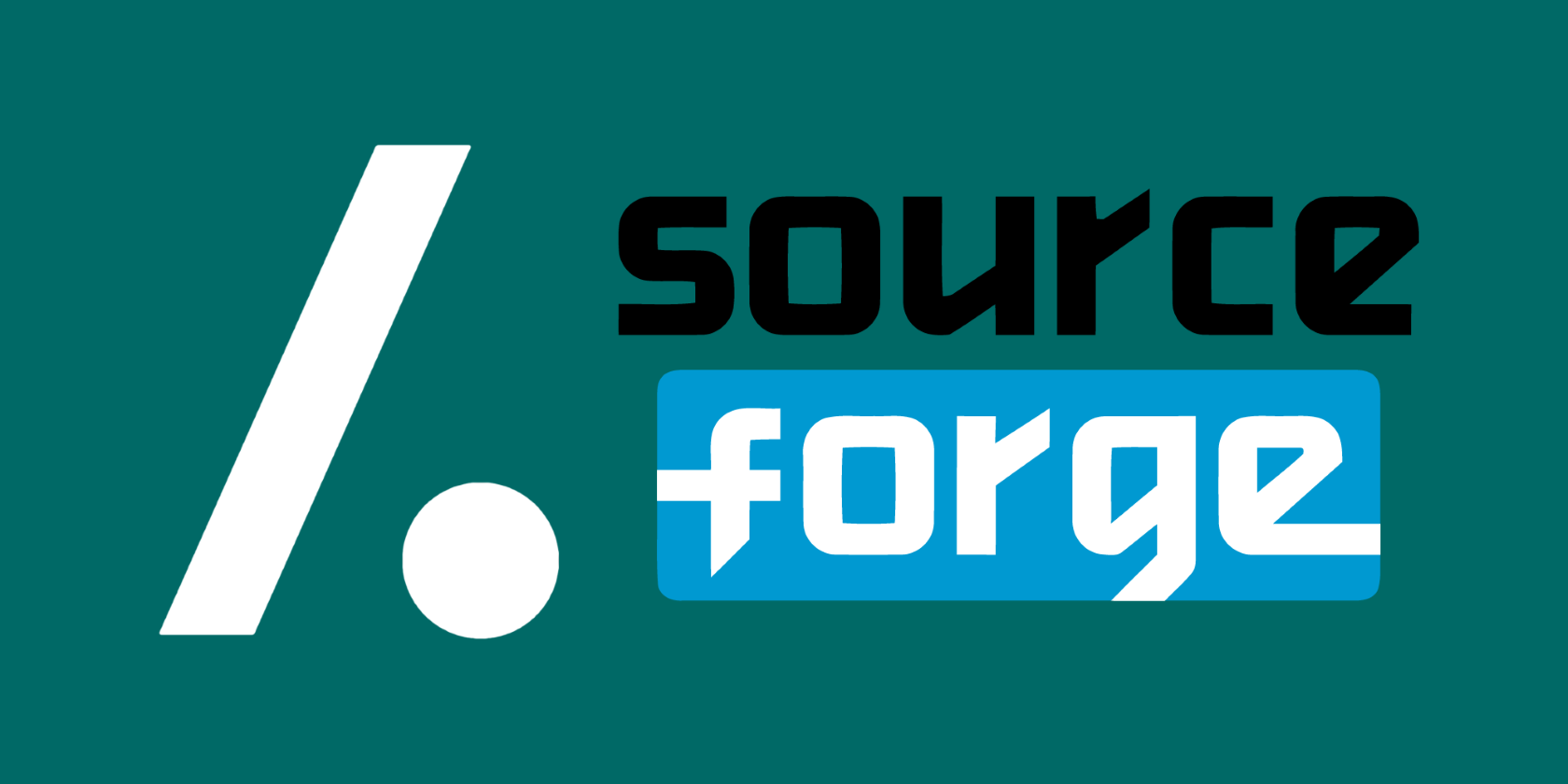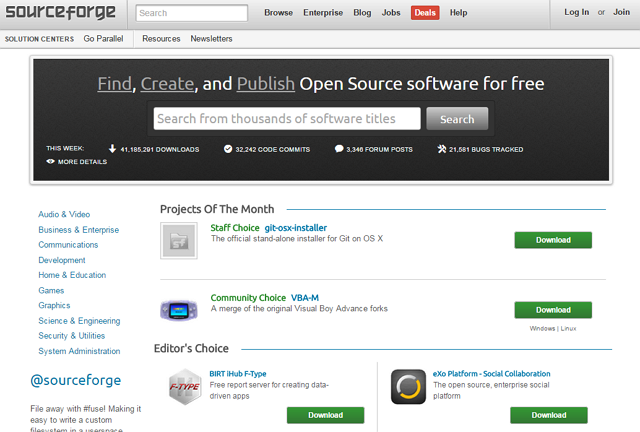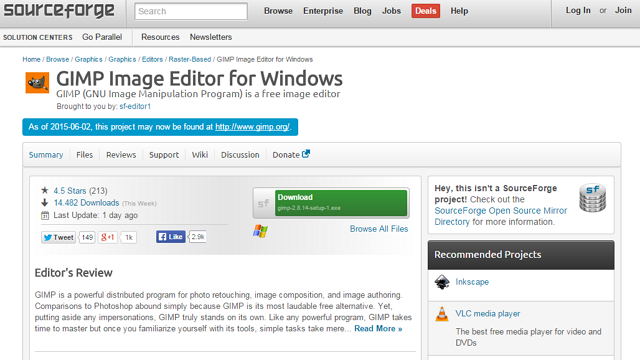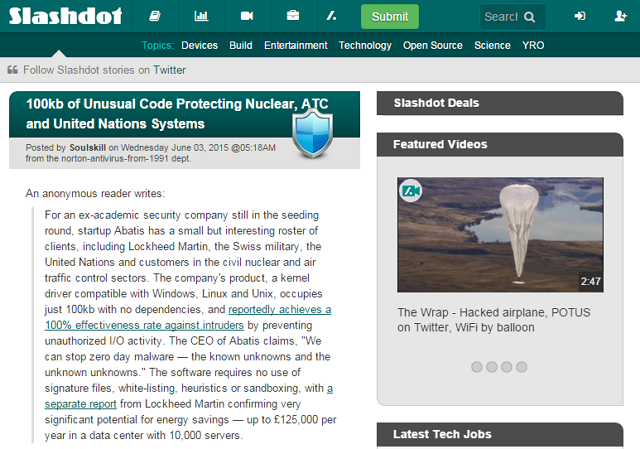Over the past few days, one of the world's premier download portals has been in the middle of a controversy. SourceForge, renowned for hosting open-source programs and free software, was attacked for allegedly misleading its users. Then its sister company, web news aggregator Slashdot, was attacked for seemingly hiding these allegations. It's the latest chapter in the decline of Slashdot, once an important corner of the web.
What's The Controversy?
SourceForge has historically been loved by developers for its support of open-source software. However, the software repository has recently started a practice that has met with the ire of developers everywhere, particularly GIMP, everyone's favorite free open-source image editor.
If you tried to download the GIMP installer for Windows, you would expect to get only GIMP, right? Well, SourceForge has recently started bundling other software as part of the installer file, which can trick non-tech-savvy users into downloading and installing programs they did not intend to.
This isn't the first time SourceForge has tried this. Back in 2013, shortly after it was bought by DHI Group (which owns several job listing and career websites), SourceForge had done the same thing. GIMP also objected back then, after which SourceForge promised it would never do that again.
The GIMP team's full statement about the new fiasco says, "To us, this firmly places SourceForge among the dodgy crowd of download sites. SourceForge are abusing the trust that we and our users had put into their service in the past."
SourceForge has now backtracked on the GIMP issue and said that third-party bundled software offers will only be available through those software makers who choose to sign up for such an offer. But yes, this means that if you are downloading from SourceForge, you need to carefully look at what you are installing — you might just be getting more programs than you intended.
Where Does Slashdot Fit Into This?
This controversy has also reflected poorly upon Slashdot, which is also owned by DHI Group. Slashdot and SourceForge have been sister companies since the latter's inception. Slashdot is famous for being one of the oldest news aggregators and geek-culture websites on the web, but it allegedly buried the news of the SourceForge controversy. And the Internet was relentless in pointing that out:
Eventually, Slashdot did post the story on its front page, with the editor claiming he had a busy weekend only to come back to find that people were freaking out about this news being buried.
"That's not a very convincing excuse when tens of stories were posted by various editors, including the one who ended up making the Sourceforge/GIMP post, since the Sourceforge/GIMP story broke last Wednesday," engineer Dan Luu writes. "Moreover, the Slashdot story is very careful to use terms like 'modified binary' and 'present third party offers' instead of 'malware' or 'adware'. This would have been a really strange response during the CmdrTaco days, but here we are."
Why Slashdot Matters
Since its inception in 1997, Slashdot has been one of the loudest voices on the Internet in support of open-source projects and ideals. A lot of it comes down to the man behind Slashdot, the aforementioned CmdrTaco — Rob Malda.
Malda started Slashdot as a hobby, a way to collect interesting links that he wanted to share with others. Malda was a geek's geek, reveling in geek pop culture, talking code with the best of them, and upholding ideals like open source. He grew a fan base for Slashdot that, for lack of a better term, was the Internet before the Internet. It's where geeks used to reside on the Internet.
Slashdot was the first to harness the geek community force that you see on today on Reddit, on Twitter, on aggregation sites like Techmeme, and even on newcomers like Product Hunt. It was a daily visit for every level of tech enthusiast, from the legendary Steve Wozniak to scientists at the South Pole, and of course, everyday people like you and me. At one point, if a new startup or a small website was linked by Slashdot, the resultant traffic would cause it to crash, chronicled in a case study that called this The Slashdot Effect. Yup, this is the original — the Reddit Effect, Digg Effect, and others all came much later.
Malda was a key part of the attraction of Slashdot. While he didn't rule with an iron fist, his personality came through in the site. It was his baby, he was proud of the voice it had. He even proposed to his wife in a public post on the site.
In August 2011, Malda resigned from Slashdot and things haven't been the same since. The new Slashdot redesign received tons of complaints, and if you follow Malda on Twitter, you'll often find people telling him things aren't the same since his departure.
The whole SourceForge debacle has been yet another incident in a long series of people being disillusioned by Slashdot, and longing for what it once stood for.
"This is exactly the kind of thing Slashdot readers and moderators normally make hay about. But CmdrTaco has been gone for years, as has the old Slashdot," Luu says.
Do You Still Use Slashdot and SourceForge?
If you're up for a bit of nostalgia or just want to know the history of Slashdot, check out Malda's trip down memory lane:
https://www.anrdoezrs.net/links/7251228/type/dlg/sid/UUmuoUeUpU53000/https://vimeo.com/39031018
While their image might be tarnished, Slashdot and SourceForge are not dead. Malda himself thinks Slashdot is in good hands. Do you still use Slashdot for your reading and SourceForge for your downloads? If not, which sites do you go to instead?
Image credits: redjar/Flickr, J J Merelo / Flickr, Jason Tester Guerrilla Futures / Flickr





